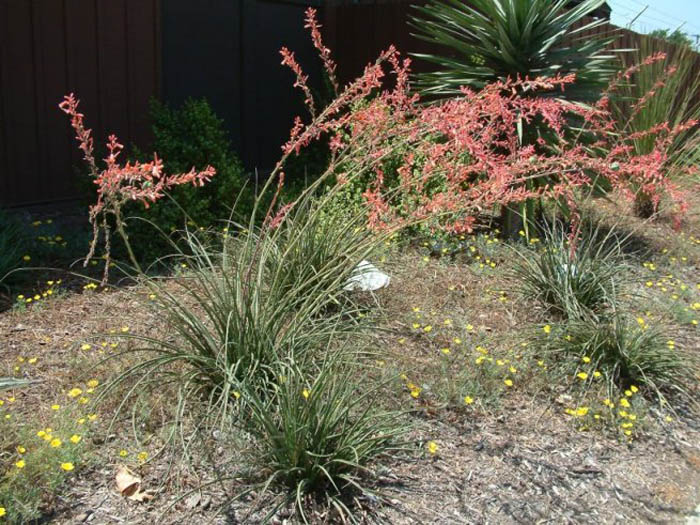Hesperaloe parviflora
Red Yucca

Description
This spectacular succulent grows to 3' tall and wide. Blue green leaves are strap-like, leathery, long, with white fraying fibers on the edges. During the summer, dark pink flowers are seen on red flower arching stalks. Hummingbirds love these flowers. This evergreen plant is drought tolerant once it's established but will appreciate extra water during the summer to promote blooms. Plant in full sun or light shade, with well draining soil. Deer like the foliage. This plant looks great in pots.
Maintenance Tips
Hesperaloe parviflora is a grass-like succulent that is also known as Red Yucca. The arching, sword-like leaves grow 2-3' tall in a tuft about 3' across. The flower spikes are coral-red and stand up to 6' tall in the spring. In mild climates, the flowers can continue through the fall. This is a very low-maintenance plant that will look and perform its best when planted in very well-drained soil in a sunny location. If it is given the space it needs to reach its mature size, there should be no reason to prune the foliage. To keep the plant looking tidy, you can remove the spent blooms and remove old leaves that collect under the foliage.
Plant Type
Succulent
Height Range
3-6'
Flower Color
Pink, Red
Flower Season
Spring, Summer
Leaf Color
Blue Green, White, Variegated
Bark Color
n/a
Fruit Color
n/a
Fruit Season
n/a
Sun
Full
Water
Very Low, Extra in Summer
Growth Rate
Moderate
Soil Type
Sandy, Clay, Loam, Rocky, Unparticular
Soil Condition
Average, Poor, Well-drained, Dry
Soil pH
Neutral, Basic
Adverse Factors
n/a
Design Styles
Mediterranean, Ranch, Spanish, Wild Garden
Accenting Features
Showy Flowers, Silhouette, Specimen, Unusual Shape
Seasonal Interest
Spring, Summer
Location Uses
Entry, Perennial Border, Foundation, Parking Strip, Patio, Park, Parking Lot, Raised Planter, Roadside, Swimming Pool, With Rocks
Special Uses
Container, Cut Flowers, Filler, Mass Planting, Naturalizing
Attracts Wildlife
Hummingbirds
Water Saving Tip:
Water between sunset and sunrise when temperatures and wind are the lowest.